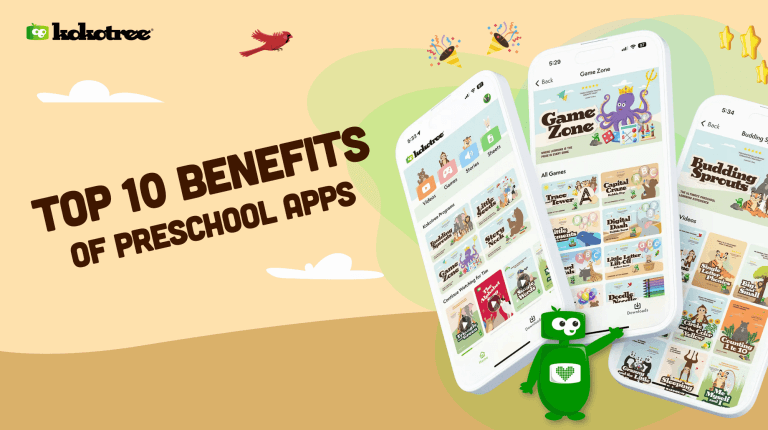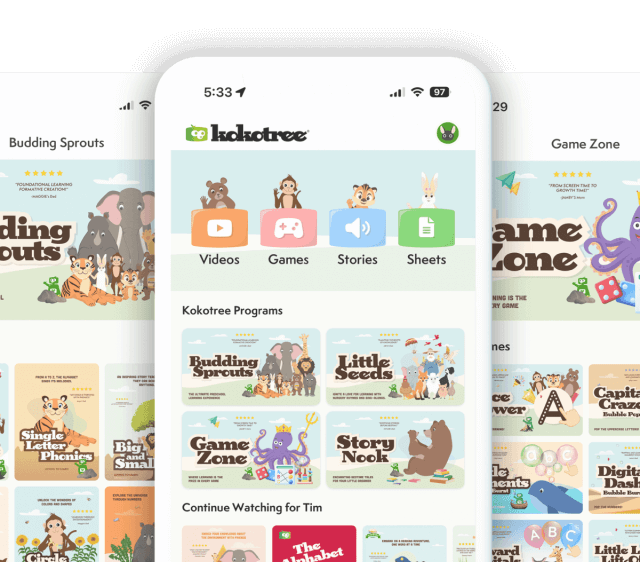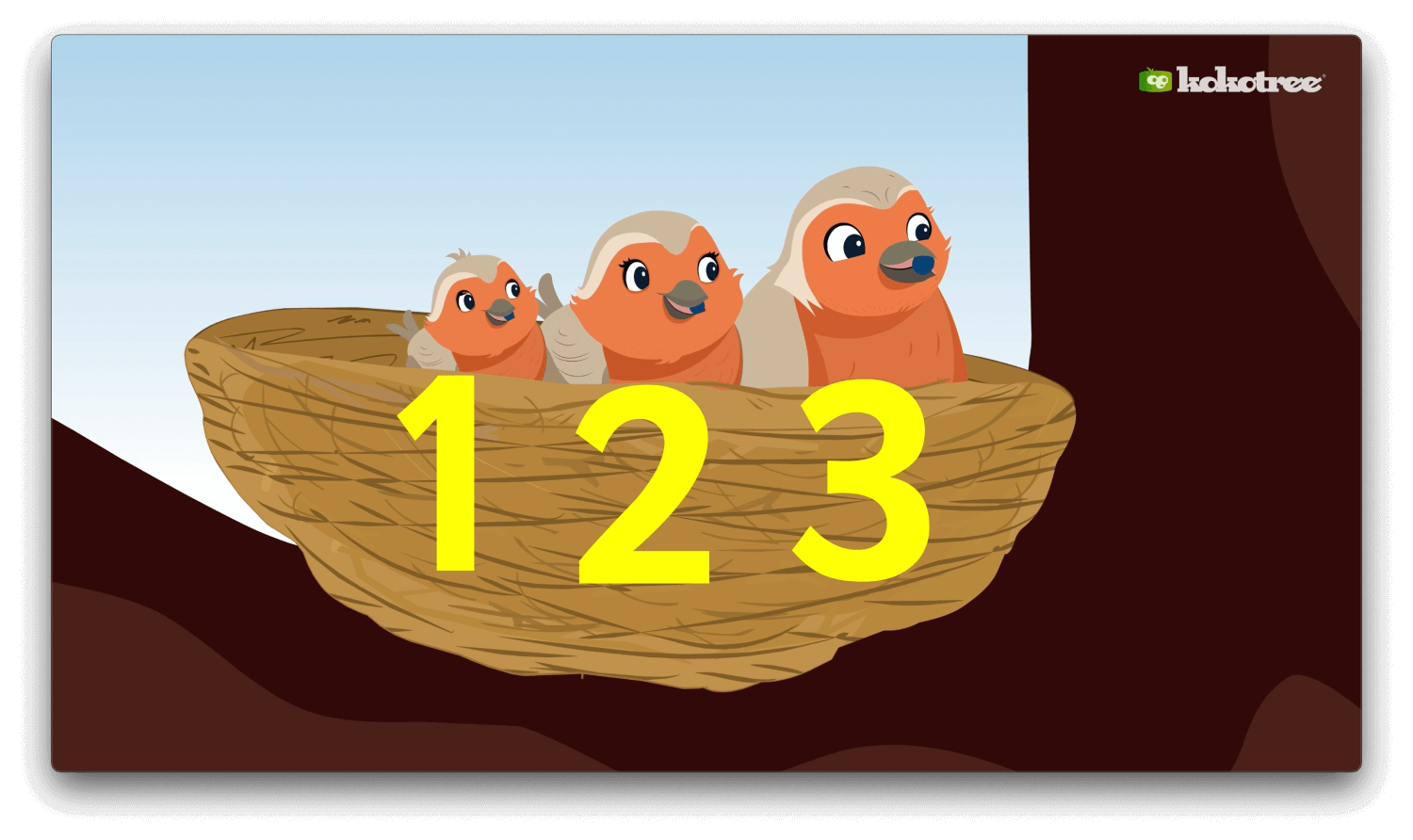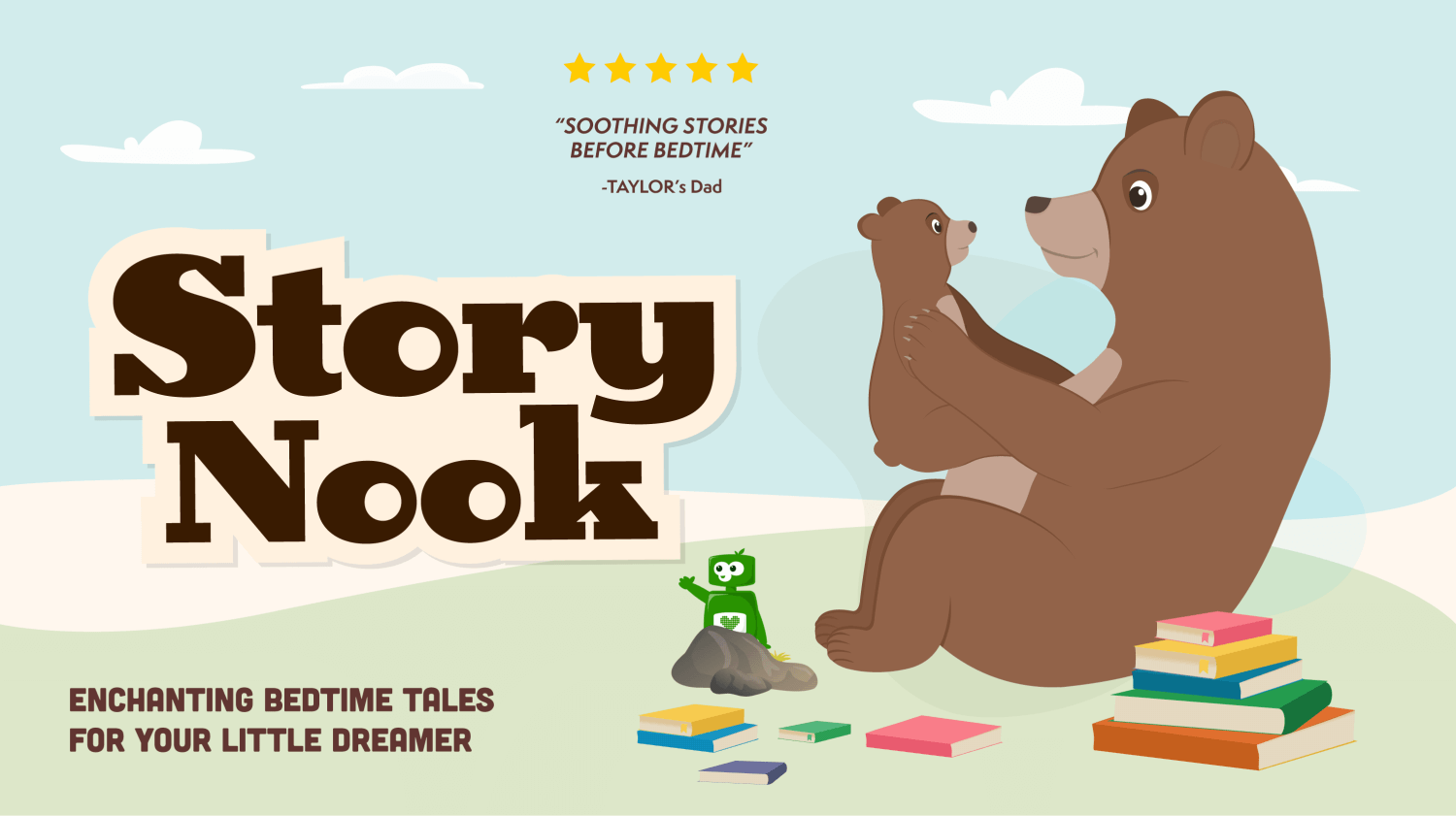

Technology isn’t just a luxury—it’s a necessity. This shift has propelled the rise of educational software, particularly mobile applications, transforming how we approach early education. No longer are classrooms confined to four walls. Instead, they’re accessible right at our fingertips, offering our little ones a wealth of learning opportunities.
Preschool apps have emerged as educational game-changers, bridging the gap between fun and learning. The following sections will discuss ten essential benefits of educational preschool apps that can improve your child’s learning journey.
Educational preschool apps are interactive software applications designed for children in their early years, usually between ages 3 and 5. Kokotree, for example, is an award-winning educational learning app that offers various engaging and fun activities for kids, preschoolers, and toddlers.
They encompass a broad spectrum of themes, ranging from mathematics to language and creativity to critical thinking. Many of these apps reflect children’s hobbies and interests, making learning a more personal and enjoyable experience.
They might incorporate popular toys and favorite cartoons and match children’s sense of humor, creating a friendly learning environment that keeps the child hooked and interested.

Educational preschool apps significantly affect a child’s cognitive development and learning. Their interactive nature encourages active learning and engagement in the learning process. These apps help children perceive things from different perspectives and engage in robust mental processes, providing a solid foundation for their cognitive development.
Furthermore, these apps enhance meaningful learning and promote social interaction and critical skills for a child’s development. For instance, they might use on-screen characters for parasocial interactions, effectively increasing a child’s engagement and learning.
Moreover, these apps provide immediate feedback and adjust the difficulty level to match a child’s performance, enabling personalized learning experiences that cater to each child’s unique educational needs and pace. The best educational apps for preschoolers offer a variety of features and activities that support these aspects of child development.
Educational preschool apps are a dynamic, engaging, and effective tool for preschool education, making them pivotal for a child’s comprehensive development in today’s digital era.

In today’s fast-paced, tech-driven world, educational preschool apps offer numerous benefits, one of the most crucial being facilitating school readiness. These apps equip kids with the essential academic knowledge and procedural familiarity of regular school routines, preparing them for the giant leap.
Early learning apps aren’t just fancy games – they pack a punch when teaching academic content, too. Research shows that digital game-based learning could help children aged 3-6 develop creative and critical thinking skills, facilitating knowledge transfer (Behnamnia et al., 2020).
In the UK, for instance, the Department of Education recommends six literacy and language learning apps for preschool-age children to support the development of their early school readiness skills.
As digital mediums, these educational apps incorporate various sensory stimuli, including sound and visuals, making learning engaging, eclectic, and practical.
Beyond academic concepts, these apps also simulate the environment of a school setting. As prescribed structures and routines form a vital part of a school day, introducing preschoolers to this framework helps lessen anxiety and resistance when transitioning to formal schooling.
An app’s design sophistication, whether static, with movement, mixed-type, or animated, can effectively mimic real-life classroom scenes and routines. Budding learners thus become familiar with activities like circle times, role-plays, or waiting turns even before their first school day, providing them a head start.
By using educational preschool apps, children are not just playing games but actively preparing for the next significant chapter in their academic journey. With a finger swipe, they’re transitioning smoothly to school, ready to make the most of their learning experiences.

Literacy skills lay the foundation for academic success. Studies show early literacy skills significantly shape a child’s future learning journey. As suggested by authors at FIU’s Center for Children and Families, preschool apps can facilitate this crucial phase of learning remarkably. Furthermore, these apps concentrate on two vital components of early literacy: alphabet recognition and phonological awareness.
Recognizing the alphabet and understanding the corresponding sounds form the basis of early literacy. Interactive preschool apps help children identify letters and associate them with specific sounds. They utilize visual and auditory cues, aiding children in comprehending the alphabet-sound correspondence.
It’s not just about spotting a ‘B’ on a screen but also recognizing that ‘B’ represents the /b/ sound. Significantly, these apps often integrate amusing animations and captivating sounds, making the learning process enjoyable rather than tedious.
Early childhood is the appropriate time to develop phonological awareness, which involves identifying andunds in spoken words. Research shows manipulating so that this attribute builds a strong foundation for reading skills.
It is precisely where educational preschool apps show their magic. They introduce multiple phonics-based activities, engaging the learner in segmenting words into sounds or blending sounds to make words.
For instance, kids get to pop bubbles carrying sounds that integrate into a word or dash across a track while catching sounds to form a word. These fun-filled, engaging exercises in apps encourage children to explore the fascinating world of sounds and words.
Adopting educational preschool apps in children’s learning routines significantly influences cognitive development. This section explores how these tools contribute to attention and concentration, memory and recall, and logical reasoning and problem-solving abilities.
Preschool apps develop children’s capacity for attention and concentration by presenting tasks that require focused engagement. These apps deploy intriguing stimuli, such as continuous and intermittent distractors, to boost preschoolers’ cognitive performance (Colombo J, 2007).
Immersing children in interactive tasks draws their full attention, heightening their concentration skills. Preschool apps improve a child’s consistent focus by presenting diverse tasks and distractions, an essential skill for academic excellence.
Memory refinement is part of cognitive development. Educational preschool apps are a digital tool that offers this development. They incorporate challenges that ensure children exercise their memory and recall functions regularly.
For instance, games that involve color, shape, or character matching require children to remember prior information. Sequential storytelling necessitates recall of plot order, encouraging memory reinforcement. These apps employ user-friendly and age-appropriate illustrations, enhancing the child’s mental alertness and recall ability.
An early introduction to problem-solving is a cornerstone of cognitive development. Preschool apps present objective-focused challenges, stimulating children’s logical reasoning skills. Through engaging storylines or puzzles, children learn to identify patterns, predict outcomes, and make logical associations to resolve on-screen problems.
As a result, their ability to comprehend, synthesize information, and apply analytical skills is enhanced, forming a solid foundation for more complex critical thinking and problem-solving skills in later academic years. These capabilities, provided by preschool apps, position children towards a favorable academic trajectory through refined cognitive development.
Incorporating early learning through educational preschool apps significantly impacts social-emotional development in young children. These apps, mainly those interactive, play an instrumental role in early math and language literacy skills. That said, their focus extends beyond academics to develop social-emotional attributes in children.
Interaction with educational apps enables children to understand and handle their emotions more effectively. For example, interactive story apps narrating simple stories with varied emotional contexts allow children under six to distinguish between feelings and emotions. As a result, they learn to manage distressing emotions better over time.
However, it’s important to note that while mobile learning through educational apps holds considerable learning benefits, excessive screen time could lead to stress, mood swings, and sleep disruptions. Hence, a balanced approach is indispensable when integrating digital learning tools.
Although traditional learning settings might provide robust avenues for social interactions, individual interactions with educational apps don’t necessarily deter children from developing essential social skills. Children can visualize various social situations by leveraging scenario-based games or app character interactions.
In turn, they learn necessary social skills and develop empathy. For instance, role-playing games stimulate situations where sharing, cooperation, or helping others is required, teaching children to empathize and imbibe better social etiquette.
Educational apps have a significant role in promoting a positive self-image and instilling confidence among young learners. Children who struggle in traditional settings may find solace in educational apps. These platforms provide a non-judging, interactive space where mistakes are parts of mastering new skills rather than signs of failure.
For example, an educational app commending a child’s progress after completing a specific task can be a positive reinforcement, boosting the child’s confidence and self-esteem.
Educational apps positively impact fine motor skill development. These intricate physical skills are requisite for various daily tasks and heavily influence a child’s academic success, specifically in writing and drawing assignments.
Let’s first spotlight a fundamental fine motor skill that educational apps profoundly hone – Hand-eye coordination. Apps like ‘Busy Shapes & Colors’ employ Montessori principles that help with a child’s coordination tied to real-world activities. This app, among others, presents interactive exercises that challenge kids to manipulate varied shapes and colors using their fingers, directly promoting substantial hand-eye coordination.
Take, for example, ‘Moose Math,’ another app designed to boost this skill alongside mathematical concepts. Children assist a moose and his friends complete tasks like creating moose juice smoothies or locating hide-and-seek animals. These actions directly involve accurate touches and swipes on the touchscreen, significantly improving hand-eye coordination.
Educational apps also play a vital role in advancing finger skills and precision. These fine motor skills are crucial for writing and equally imperative for tasks demanding precision. Apps such as ‘Endless Alphabet’ and ‘Pre-Writing Software present engaging activities that help children produce precise finger movements.
When tracing the letters of the alphabet or imitating patterns in the rock pool using a tangible ‘pebble,’ these apps encourage learners to make accurate gestures and promote finger agility and control.
Consider another elemental expectancy from preschool-aged children—handwriting. A selection of educational apps, mainly Pre-Writing Software, aims to prepare children for this crucial stage in their learning journey. With activities that simulate holding a ‘pencil’ and reinforce correct movement patterns, these apps prove instrumental in nurturing the fine motor skills necessary for handwriting.
Moreover, recognizable improvements in touch gesture occurrences and object manipulation—static, static movement, animation, and mixed—corroborate these benefits. As children interact with these apps, they advance their writing readiness skills, contributing to their future academic success.
These examples illustrate how efficiently educational apps support the development of fine motor skills, especially in preschool-aged children. Hand-eye coordination, dexterity, precision, and handwriting readiness—all fundamental for academic success—are considerably enhanced through thoughtful interactions with these dynamic learning tools.
Language acquisition is a crucial aspect of every child’s learning journey. From understanding simple words to constructing sentences, language forms the groundwork for all future understanding. Here, we explore how educational preschool apps facilitate this essential development.
Vocabulary acquisition is quite rightly a cornerstone of early learning. After all, a rich vocabulary allows children to express their thoughts precisely and contribute to meaningful conversations. Educational preschool apps can strengthen vocabulary development by introducing new words in a playful, interactive environment.
For instance, apps explicitly developed for language learning often combine text with visuals and audio elements. Hearing words pronounced, seeing them in context, and repeating them enhances children’s word retention. Such apps progressively introduce varied themes, expanding the vocabulary range as they advance.
Moreover, many such apps use the learning technique known as ‘spaced repetition,’ which presents words at specific intervals over time. This technique leverages our brain’s recall ability, helping words transition from short-term to long-term memory.
Learning grammar and structuring sentences are vital parts of language acquisition. Apps focusing on sentence building can refine a child’s understanding of word order, tenses, and grammatical rules.
These apps typically involve drag-and-drop exercises, where a child must arrange the words to form a sensible sentence. It’s interactive, hands-on learning that encourages logical thinking and memory recall. The contextual display of grammar in apps cements young learners’ understanding of rules and syntax.
Listening skills lay the foundation for academic success. They help children follow instructions, understand complex concepts, and interact socially.
There are plenty of educational preschool apps targeting listening comprehension. They utilize storytelling, music, and narration to enhance listening skills. Children learn to concentrate, comprehend auditory input, and follow narrated directions. Some apps even incorporate interactive activities that require following verbal instructions, further honing the child’s listening skills.
In a nutshell, educational preschool apps play an integral role in language acquisition by promoting vocabulary building, understanding grammar and sentence structure, and improving listening comprehension.
Educational preschool apps enhance problem-solving skills, sharpening a preschooler’s mind for critical analysis and decision-making. Children engage with apps that offer challenges, puzzles, and tasks, developing essential skills while keeping the learning period interactive and enjoyable.
Interactive apps promote critical thinking, allowing children to evaluate situations, make decisions, and solve problems. For instance, apps with challenging puzzles, such as the Tower of Hanoi, induce a child to analyze the game’s mechanics (Huber et al., 2015). They learn how to strategize, recognize patterns, and understand logical sequences in this process. The child also knows how to break a more significant problem into smaller, manageable parts, a skill vital for more complex problem-solving later.
Educational apps also help with a trial-and-error approach. Children aren’t penalized for their mistakes, encouraging them to engage more freely and fearlessly. Correcting errors helps a child hone error-monitoring, self-correction, and adaptive behavior skills.
Finally, preschool educational apps allow children to apply their knowledge in new situations. Each game or puzzle presents distinct challenges, compelling children to use the skills they’ve mastered in a unique context. This experience trains a child to transfer knowledge and techniques across different scenarios or domains, expanding their problem-solving capability and adaptability.
Advancements in technology are transforming traditional education systems; they’re boosting early childhood learning by introducing interactive preschool apps. These digital platforms truly inspire creativity and imagination among juveniles, aiding their overall development process. With functions ranging from animation software to video editing tools, these educational preschool apps empower children to push the boundaries of their minds, sparking a wave of refreshing ideas, concepts, and narratives.
You’ll notice that some of these apps feature open-ended play. This concept is best embodied by apps like ‘Toca Nature,’ an application that serves as a digital canvas for children, inviting them to explore the beauty of nature at their fingertips at their own pace. Picture a child, lost in the vibrance of a digital forest, crafting their adventure tale as they navigate through the app, and you’ll understand the essence of open-ended exploration.
Such an approach moves past the rigid structures of formal education, providing preschoolers with a safe digital playground to experiment, learn, and grow. Children can explore the unknown, chart new territories, and navigate through them independently, boosting their imagination, cognitive flexibility, and creativity.
Preschool apps effectively promote divergent thinking and idea generation among children. Apps such as ‘Endless Alphabet’ or ‘Moose Math,’ not to mention an array of Toca Boca’s offerings, encourage users to think outside the box. They nurture creativity, encourage imaginative thinking, and inspire innovative ideas.
It’s not merely about ticking the right option or memorizing facts; it’s about exploring different resolutions for a single situation – a feature essential in the real world. It’s refining their capacities for analysis and synthesis, nurturing a tender mind to juggle thoughts, weigh pros and cons, and develop innovative solutions to problems.
Technology isn’t confined to nurturing logic and reasoning; it also extends to cultivating potential writers and artists—platforms for storytelling and creative writing help to kindle a passion for literature and narrative creation. Applications like Daniel Tiger’s Neighborhood build narrative skills through interactive storytelling and help grow children’s love for stories.
Engaging with captivating digital narratives enhances children’s language proficiency, cognitive abilities, and social-emotional learning. They also hardwire their brains for creativity, empathy, and advanced conceptual understanding as they create, share, and partake in countless exciting stories.
Undeniably, preschool apps’ potent combination of technology and education facilitates an engaging, enriching, and creative learning environment for our young learners. It’s redefining education one screen at a time. Indeed, the future of learning is now at our fingertips.
As much as educational preschool apps are incredibly beneficial for children’s cognitive and social-emotional learning, it is essential to ensure that these digital tools are used responsibly. That leads us to our main topic—screen time guidelines.
Setting the proper screen time limits is essential to ensuring children’s healthy development and well-being. The American Academy of Pediatrics recommends different screen time limits for various age groups. For children aged 2 to 5, daily screen time, including television and computer use, should not exceed one hour. This hour should consist of high-quality programming or apps, such as educational preschool apps, that actively engage children and promote creative play.
Balance is the key for young children—balancing online and offline activities. While mobile learning apps can offer engaging and interactive learning experiences, real-world activities, such as outdoor play, arts and crafts, and traditional storytelling, are equally important. The benefits of balancing app usage and offline activities include developing physical skills, improving creativity and imagination, and giving them hands-on learning.
One key aspect of maximizing the value of screen time is through co-viewing and interaction between adults and children. As adults participate in interactive app sessions, they can guide the child, provide context, ask thought-provoking questions, and ensure the educational content aligns with their learning goals. This involvement supports children’s learning and strengthens the bond between the child and the adult, leading to good social-emotional development.
Education-based apps create interactive learning environments, making education appealing to children. They have various elements to attract children’s interest and increase their desire to learn. Engagement in educational apps is defined by multiple principles such as active learning, multi-sensory experiences for rich learning, making learning meaningful, and social interaction.
Children delight in multisensory experiences that appeal to their innate curiosity and exploration. Integrating visual, auditory, and tactile features in educational apps triggers the child’s senses interactively and engagingly. For instance, touching the screen to move objects, hearing a catchy jingle when a task is correctly completed, or seeing bright colors and graphics that help illustrate a concept.
Every child is unique and learns at their own pace. Educational apps understand this better than anyone else. They provide personalized learning paths and adjust the difficulty level according to the learner’s capabilities. The app can scale the complexity if a child finds a task challenging. If they are breezing through tasks, the app can increase the difficulty.
Immediate feedback is a potent tool for boosting a child’s confidence and motivating them to learn. It gives them a clear understanding of their performance, helping them identify their strengths and areas for improvement. Children get positive reinforcement when they accomplish a task through rewards, badges, or points. This gives them a sense of achievement and encourages them to continue learning.
Engaging and interactive learning through educational apps is a powerful way to instill a love for learning in children. With their engaging nature and the positive reinforcement children receive, they transform learning from a task into an enjoyable and fruitful experience.
It’s essential to explore the specific advantages of using educational preschool apps. These apps can revolutionize early childhood education by promoting active engagement and enabling personalized learning experiences.
Engaging, personalized, and interactive educational preschool apps offer a multidimensional learning environment, furthering children’s all-round development and preparing them for future academic endeavors.



